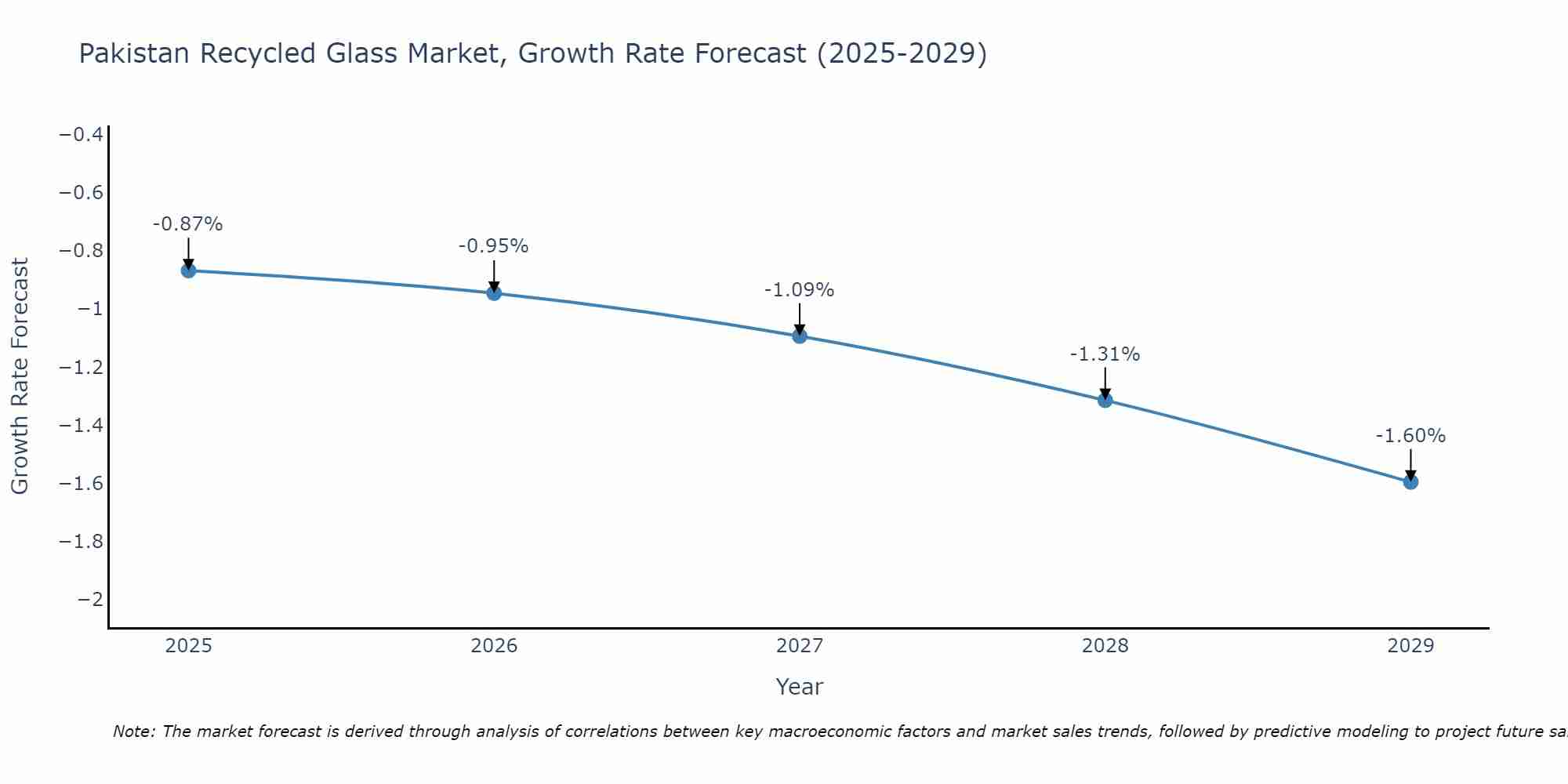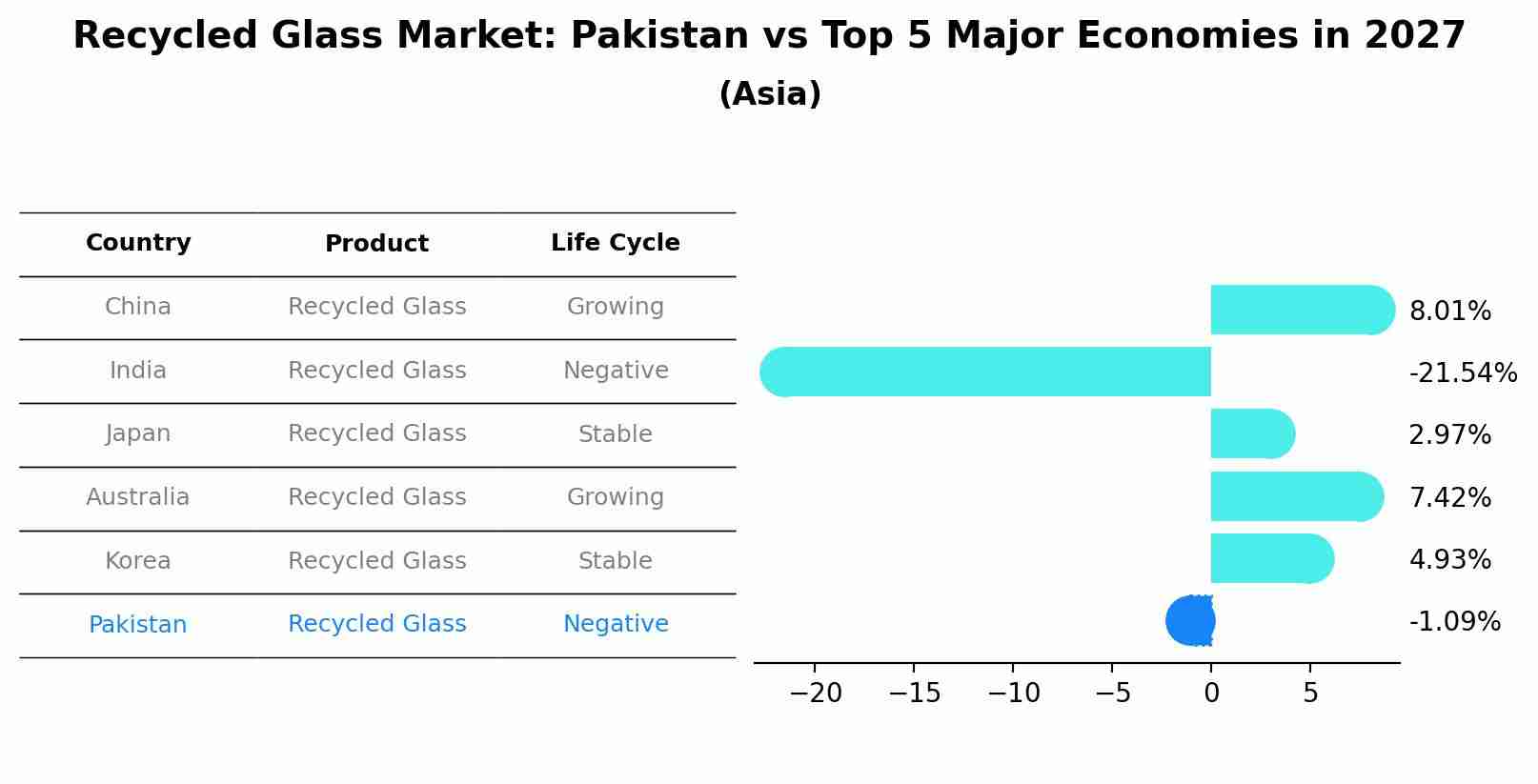Pakistan Recycled Glass Market Outlook | COVID-19 IMPACT, Growth, Companies, Size, Value, Revenue, Industry, Share, Trends, Analysis & Forecast
| Product Code: ETC355717 | Publication Date: Aug 2022 | Updated Date: Aug 2025 | Product Type: Market Research Report | |
| Publisher: 6Wresearch | Author: Sumit Sagar | No. of Pages: 75 | No. of Figures: 35 | No. of Tables: 20 |
Pakistan Recycled Glass Market Size Growth Rate
The Pakistan Recycled Glass Market could see a tapering of growth rates over 2025 to 2029. Starting high at -0.87% in 2025, the market steadily declines to -1.60% by 2029.

Recycled Glass Market: Pakistan vs Top 5 Major Economies in 2027 (Asia)
Pakistan's Recycled Glass market is anticipated to experience a negative growth rate of -1.09% by 2027, reflecting trends observed in the largest economy China, followed by India, Japan, Australia and South Korea.

Pakistan Recycled Glass Market Synopsis
The Pakistan recycled glass market is steadily growing due to increasing awareness about environmental sustainability and the benefits of using recycled materials. The demand for recycled glass in various industries such as construction, packaging, and consumer goods is on the rise as businesses and consumers look for more eco-friendly alternatives. Manufacturers in Pakistan are investing in recycling facilities to process glass waste and produce high-quality recycled glass products. The government`s initiatives to promote recycling and reduce waste generation further support the growth of the recycled glass market in Pakistan. With a focus on reducing carbon emissions and conserving natural resources, the Pakistan recycled glass market is expected to continue expanding in the coming years.
Pakistan Recycled Glass Market Trends
The Pakistan recycled glass market is experiencing a growing trend towards sustainable practices and eco-friendly products. Consumers are increasingly seeking out recycled glass products due to their lower environmental impact and aesthetic appeal. The government`s push for environmental conservation and waste management policies has also contributed to the rising interest in recycled glass. Manufacturers are responding to this trend by introducing a wider range of recycled glass products, including bottles, jars, and decorative items. Additionally, the demand for recycled glass in construction and infrastructure projects is on the rise, further driving market growth. Overall, the Pakistan recycled glass market is poised for continued expansion as awareness of environmental issues and the benefits of using recycled materials continues to grow.
Pakistan Recycled Glass Market Challenges
In the Pakistan Recycled Glass Market, one of the main challenges faced is the lack of infrastructure for collecting, sorting, and processing glass waste. Limited awareness and participation from both consumers and businesses also hinder the growth of the market. Additionally, the quality and consistency of recycled glass products may vary due to inadequate technology and equipment for recycling. Another challenge is the competition from cheaper imported glass products, which makes it difficult for locally recycled glass to compete in terms of pricing. Furthermore, the absence of government incentives or policies to promote recycling and the lack of a standardized regulatory framework further impede the development of the recycled glass market in Pakistan.
Pakistan Recycled Glass Market Investment Opportunities
The Pakistan Recycled Glass Market presents promising investment opportunities due to the increasing awareness and focus on sustainability and environmental conservation in the country. The demand for recycled glass products is rising as businesses and consumers seek eco-friendly alternatives. Investing in facilities for collecting, sorting, and processing recycled glass can be lucrative, especially with government initiatives supporting recycling efforts. Additionally, the construction sector in Pakistan is a significant consumer of glass products, providing a steady market for recycled glass materials. Collaborating with local municipalities, glass manufacturers, and businesses to establish a strong supply chain for recycled glass can lead to a profitable and socially responsible investment in the Pakistan Recycled Glass Market.
Jordan Agar Market Government Policies
The government of Pakistan has implemented various policies to promote sustainability and recycling within the glass industry. The Pakistan Environmental Protection Agency (EPA) has set guidelines for the collection, sorting, and recycling of glass waste to reduce environmental pollution. Additionally, the government offers incentives such as tax breaks and subsidies to encourage businesses to invest in glass recycling infrastructure. The National Tariff Commission (NTC) has also imposed tariffs on imported glass products to protect the domestic recycled glass market. These policies aim to foster a circular economy, reduce reliance on virgin materials, and create a more sustainable glass industry in Pakistan.
Pakistan Recycled Glass Market Future Outlook
The future outlook for the Pakistan Recycled Glass Market appears promising, driven by increasing environmental consciousness, government initiatives promoting sustainable practices, and growing consumer preference for eco-friendly products. With a rising emphasis on reducing carbon footprint and waste generation, the demand for recycled glass products is expected to surge. Additionally, the construction industry`s inclination towards sustainable building materials and the expanding packaging sector will further stimulate market growth. Collaborations between industry players, technological advancements in recycling processes, and evolving consumer behavior towards responsible consumption are likely to fuel the market`s expansion. However, challenges such as lack of infrastructure and awareness regarding recycling practices may hinder the market`s full potential. Overall, the Pakistan Recycled Glass Market is poised for significant growth in the coming years.
Key Highlights of the Report:
- Pakistan Recycled Glass Market Outlook
- Market Size of Pakistan Recycled Glass Market, 2021
- Forecast of Pakistan Recycled Glass Market, 2031
- Historical Data and Forecast of Pakistan Recycled Glass Revenues & Volume for the Period 2018 - 2031
- Pakistan Recycled Glass Market Trend Evolution
- Pakistan Recycled Glass Market Drivers and Challenges
- Pakistan Recycled Glass Price Trends
- Pakistan Recycled Glass Porter's Five Forces
- Pakistan Recycled Glass Industry Life Cycle
- Historical Data and Forecast of Pakistan Recycled Glass Market Revenues & Volume By Product for the Period 2018 - 2031
- Historical Data and Forecast of Pakistan Recycled Glass Market Revenues & Volume By Crushed Glass for the Period 2018 - 2031
- Historical Data and Forecast of Pakistan Recycled Glass Market Revenues & Volume By Cullets for the Period 2018 - 2031
- Historical Data and Forecast of Pakistan Recycled Glass Market Revenues & Volume By Glass Powder for the Period 2018 - 2031
- Historical Data and Forecast of Pakistan Recycled Glass Market Revenues & Volume By Application for the Period 2018 - 2031
- Historical Data and Forecast of Pakistan Recycled Glass Market Revenues & Volume By Glass Bottle & Containers for the Period 2018 - 2031
- Historical Data and Forecast of Pakistan Recycled Glass Market Revenues & Volume By Flat Glass for the Period 2018 - 2031
- Historical Data and Forecast of Pakistan Recycled Glass Market Revenues & Volume By Fiber Glass for the Period 2018 - 2031
- Historical Data and Forecast of Pakistan Recycled Glass Market Revenues & Volume By Highway Beads for the Period 2018 - 2031
- Historical Data and Forecast of Pakistan Recycled Glass Market Revenues & Volume By Abrasives for the Period 2018 - 2031
- Historical Data and Forecast of Pakistan Recycled Glass Market Revenues & Volume By Fillers for the Period 2018 - 2031
- Historical Data and Forecast of Pakistan Recycled Glass Market Revenues & Volume By Others for the Period 2018 - 2031
- Pakistan Recycled Glass Import Export Trade Statistics
- Market Opportunity Assessment By Product
- Market Opportunity Assessment By Application
- Pakistan Recycled Glass Top Companies Market Share
- Pakistan Recycled Glass Competitive Benchmarking By Technical and Operational Parameters
- Pakistan Recycled Glass Company Profiles
- Pakistan Recycled Glass Key Strategic Recommendations
Frequently Asked Questions About the Market Study (FAQs):
- Single User License$ 1,995
- Department License$ 2,400
- Site License$ 3,120
- Global License$ 3,795
Search
Thought Leadership and Analyst Meet
Our Clients
Related Reports
- Canada Oil and Gas Market (2026-2032) | Share, Segmentation, Value, Industry, Trends, Forecast, Analysis, Size & Revenue, Growth, Competitive Landscape, Outlook, Companies
- Germany Breakfast Food Market (2026-2032) | Industry, Share, Growth, Size, Companies, Value, Analysis, Revenue, Trends, Forecast & Outlook
- Australia Briquette Market (2025-2031) | Growth, Size, Revenue, Forecast, Analysis, Trends, Value, Share, Industry & Companies
- Vietnam System Integrator Market (2025-2031) | Size, Companies, Analysis, Industry, Value, Forecast, Growth, Trends, Revenue & Share
- ASEAN and Thailand Brain Health Supplements Market (2025-2031) | Strategy, Consumer Insights, Analysis, Investment Trends, Opportunities, Growth, Size, Share, Industry, Revenue, Segments, Value, Segmentation, Supply, Forecast, Restraints, Outlook, Competition, Drivers, Trends, Demand, Pricing Analysis, Competitive, Strategic Insights, Companies, Challenges
- ASEAN Bearings Market (2025-2031) | Strategy, Consumer Insights, Analysis, Investment Trends, Opportunities, Growth, Size, Share, Industry, Revenue, Segments, Value, Segmentation, Supply, Forecast, Restraints, Outlook, Competition, Drivers, Trends, Demand, Pricing Analysis, Competitive, Strategic Insights, Companies, Challenges
- Europe Flooring Market (2025-2031) | Outlook, Share, Industry, Trends, Forecast, Companies, Revenue, Size, Analysis, Growth & Value
- Saudi Arabia Manlift Market (2025-2031) | Outlook, Size, Growth, Trends, Companies, Industry, Revenue, Value, Share, Forecast & Analysis
- Uganda Excavator, Crane, and Wheel Loaders Market (2025-2031) | Strategy, Consumer Insights, Analysis, Investment Trends, Opportunities, Growth, Size, Share, Industry, Revenue, Segments, Value, Segmentation, Supply, Forecast, Restraints, Outlook, Competition, Drivers, Trends, Demand, Pricing Analysis, Competitive, Strategic Insights, Companies, Challenges
- Rwanda Excavator, Crane, and Wheel Loaders Market (2025-2031) | Strategy, Consumer Insights, Analysis, Investment Trends, Opportunities, Growth, Size, Share, Industry, Revenue, Segments, Value, Segmentation, Supply, Forecast, Restraints, Outlook, Competition, Drivers, Trends, Demand, Pricing Analysis, Competitive, Strategic Insights, Companies, Challenges
Industry Events and Analyst Meet
Whitepaper
- Middle East & Africa Commercial Security Market Click here to view more.
- Middle East & Africa Fire Safety Systems & Equipment Market Click here to view more.
- GCC Drone Market Click here to view more.
- Middle East Lighting Fixture Market Click here to view more.
- GCC Physical & Perimeter Security Market Click here to view more.
6WResearch In News
- Doha a strategic location for EV manufacturing hub: IPA Qatar
- Demand for luxury TVs surging in the GCC, says Samsung
- Empowering Growth: The Thriving Journey of Bangladesh’s Cable Industry
- Demand for luxury TVs surging in the GCC, says Samsung
- Video call with a traditional healer? Once unthinkable, it’s now common in South Africa
- Intelligent Buildings To Smooth GCC’s Path To Net Zero


















